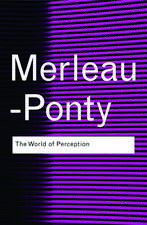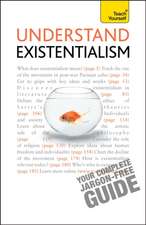Phenomenology and Embodiment: Husserl and the Constitution of Subjectivity: Studies in Phenomenology and Existential Philosophy
Autor Joona Taipaleen Limba Engleză Paperback – 27 feb 2014
At the dawn of the modern era, philosophers reinterpreted their subject as the study of consciousness, pushing the body to the margins of philosophy. With the arrival of Husserlian thought in the late nineteenth century, the body was once again understood to be part of the transcendental field. And yet, despite the enormous influence of Husserl’s phenomenology, the role of "embodiment" in the broader philosophical landscape remains largely unresolved. In his ambitious debut book, Phenomenology and Embodiment, Joona Taipale tackles the Husserlian concept—also engaging the thought of Maurice Merleau-Ponty, Jean-Paul Sartre, and Michel Henry—with a comprehensive and systematic phenomenological investigation into the role of embodiment in the constitution of self-awareness, intersubjectivity, and objective reality. In doing so, he contributes a detailed clarification of the fundamental constitutive role of embodiment in the basic relations of subjectivity.
Din seria Studies in Phenomenology and Existential Philosophy
-
 Preț: 181.76 lei
Preț: 181.76 lei -
 Preț: 194.88 lei
Preț: 194.88 lei -
 Preț: 329.98 lei
Preț: 329.98 lei -
 Preț: 255.61 lei
Preț: 255.61 lei -
 Preț: 314.27 lei
Preț: 314.27 lei -
 Preț: 255.38 lei
Preț: 255.38 lei -
 Preț: 306.60 lei
Preț: 306.60 lei -
 Preț: 339.71 lei
Preț: 339.71 lei -
 Preț: 272.32 lei
Preț: 272.32 lei -
 Preț: 250.29 lei
Preț: 250.29 lei -
 Preț: 265.88 lei
Preț: 265.88 lei -
 Preț: 221.59 lei
Preț: 221.59 lei -
 Preț: 215.68 lei
Preț: 215.68 lei -
 Preț: 275.22 lei
Preț: 275.22 lei -
 Preț: 245.79 lei
Preț: 245.79 lei -
 Preț: 269.44 lei
Preț: 269.44 lei -
 Preț: 215.68 lei
Preț: 215.68 lei -
 Preț: 240.26 lei
Preț: 240.26 lei -
 Preț: 235.17 lei
Preț: 235.17 lei -
 Preț: 215.94 lei
Preț: 215.94 lei -
 Preț: 248.05 lei
Preț: 248.05 lei -
 Preț: 226.89 lei
Preț: 226.89 lei -
 Preț: 137.25 lei
Preț: 137.25 lei -
 Preț: 240.01 lei
Preț: 240.01 lei -
 Preț: 165.56 lei
Preț: 165.56 lei -
 Preț: 242.69 lei
Preț: 242.69 lei - 18%
 Preț: 698.04 lei
Preț: 698.04 lei -
 Preț: 195.68 lei
Preț: 195.68 lei -
 Preț: 267.53 lei
Preț: 267.53 lei -
 Preț: 223.63 lei
Preț: 223.63 lei -
 Preț: 314.03 lei
Preț: 314.03 lei - 21%
 Preț: 480.24 lei
Preț: 480.24 lei - 11%
 Preț: 274.46 lei
Preț: 274.46 lei - 11%
 Preț: 214.35 lei
Preț: 214.35 lei - 10%
 Preț: 232.06 lei
Preț: 232.06 lei - 11%
 Preț: 229.67 lei
Preț: 229.67 lei - 6%
 Preț: 331.75 lei
Preț: 331.75 lei - 36%
 Preț: 165.14 lei
Preț: 165.14 lei -
 Preț: 139.02 lei
Preț: 139.02 lei - 11%
 Preț: 228.57 lei
Preț: 228.57 lei - 12%
 Preț: 204.99 lei
Preț: 204.99 lei - 13%
 Preț: 252.48 lei
Preț: 252.48 lei - 13%
 Preț: 251.36 lei
Preț: 251.36 lei - 23%
 Preț: 588.68 lei
Preț: 588.68 lei
Preț: 220.74 lei
Nou
Puncte Express: 331
Preț estimativ în valută:
42.24€ • 44.10$ • 34.96£
42.24€ • 44.10$ • 34.96£
Carte tipărită la comandă
Livrare economică 04-18 aprilie
Preluare comenzi: 021 569.72.76
Specificații
ISBN-13: 9780810129504
ISBN-10: 0810129507
Pagini: 256
Dimensiuni: 152 x 229 x 23 mm
Greutate: 0.34 kg
Ediția:First Edition
Editura: Northwestern University Press
Colecția Northwestern University Press
Seria Studies in Phenomenology and Existential Philosophy
ISBN-10: 0810129507
Pagini: 256
Dimensiuni: 152 x 229 x 23 mm
Greutate: 0.34 kg
Ediția:First Edition
Editura: Northwestern University Press
Colecția Northwestern University Press
Seria Studies in Phenomenology and Existential Philosophy
Notă biografică
Descriere
At the dawn of the modern era, philosophers reinterpreted their subject as the study of consciousness, pushing the body to the margins of philosophy. With the arrival of Husserlian thought in the late nineteenth century, the body was once again understood to be part of the transcendental field. And yet, despite the enormous influence of Husserl’s phenomenology, the role of "embodiment" in the broader philosophical landscape remains largely unresolved. In his ambitious debut book, Phenomenology and Embodiment, Joona Taipale tackles the Husserlian concept—also engaging the thought of Maurice Merleau-Ponty, Jean-Paul Sartre, and Michel Henry—with a comprehensive and systematic phenomenological investigation into the role of embodiment in the constitution of self-awareness, intersubjectivity, and objective reality. In doing so, he contributes a detailed clarification of the fundamental constitutive role of embodiment in the basic relations of subjectivity.


















